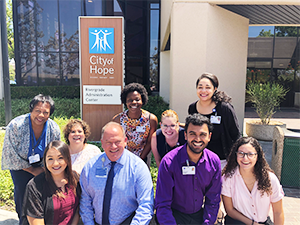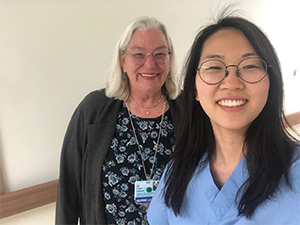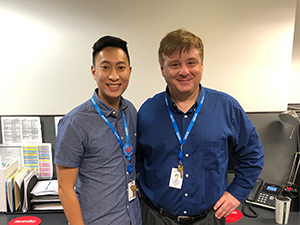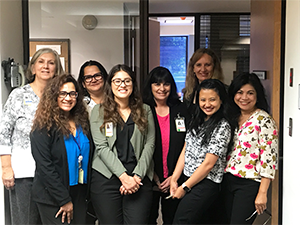
Overview
In 2018, HASC began partnering with Health Career Connection (HCC), a national internship program. HCC connects talented and diverse college undergraduates and recent graduates, particularly from underrepresented backgrounds, with opportunities to pursue health care and public health careers.
HASC’s HCC workforce initiative effort — the College to Career Diversity Internship Program (CDIP) — is a 10-week, full-time paid internship program. CDIP recruits diverse, high-performing students and recent graduates whose interests and skills align with HASC members’ needs and projects. The program also enables hospitals to meet broader diversity and workforce goals by offering an efficient pipeline for integrating new talent into open positions.
HASC works with HCC to connect with leadership at member hospitals to assist with:
- Hosting an intern
- Identifying your substantive project
- Completing the agreement process
- Recruitment via targeted promotions on HASC communications and digital marketing channels
Program Details
Your role as a Host Organization/Preceptor:
- Offer a full-time, 10-week internship experience
- Provide intern with meaningful projects and learning opportunities
- Dedicate a preceptor to provide guidance and mentorship
- Offer intern exposure to leadership, structure, operations and decisions
- Fund the cost of an HCC intern: $7,500
HCC will alert candidates and preceptors about potential interviews. Typically, candidates receive up to three interviews and host sites up to three interviewees. These numbers may vary in some cases. CDIP’s goal is to best match intern interests and member project descriptions.
Once your site has held interviews, HCC will survey the intern and your site, compare feedback and screen for a potential match.
- September – March: HASC member host sites are recruited.
- September – January: Host sites submit their project scopes of work. HCC reviews submissions and screens candidates applying for Southern California internship placement.
- January – February: HCC matches candidates by project objectives, skills and host site.
- March – April: Host sites conduct interviews. Candidates and sites submit feedback on interviews.
- May – June: HCC confirms host-intern matches and onboards interns into program. Host sites and interns connect to complete additional onboarding processes.
- May – September: Summer internships and program take place and are completed.
To host a 2024 CDIP intern, please complete the Internship Host Interest Form and notify HASC Workforce Development Program Director Soyinka Allen of your interest. Allen is also available to answer questions about the program. However, core program onboarding is done through Patricia Etem from HCC.
Note: The CDIP Agency Intent Form is made available each year in September.
The total cost is $7,500 for one intern. From this program fee, interns receive a $4,300 stipend.
Leaders from other HCC programs endorse CDIP for producing a positive return through:
- Accomplishing high-level, practical scopes of work for hospitals with low project costs and high completion rate
- Advancing workforce development and diversity objectives
- Strengthening the local economy by helping local health care dollars stay in the community
- Addressing local and regional medically underserved areas (MUAs) by expanding the number of health care workers to meet the demand for services
- Improving long-term onboarding of new talent through an efficient program framework
- 100 percent of CDIP preceptors say hosting an intern is a good return on investment.
- 95 percent of CDIP preceptors were satisfied with their intern’s contribution to the organization.
- 75 percent of CDIP alumni are now employed and working in health-related fields

Joi Torrence-Hill, MHA, FACHE
Chief, USC Norris Hospital Operations
Keck Medicine of USC
“During my internship, I learned the importance of building and cultivating relationships with those with whom you work. This lesson has guided me daily in my current position as I work with new people in an organization that is driven by the delivery of quality patient care and service excellence. HCC (HASC CDIP) is a worthwhile investment.”

Ikenna Mmeje, FACHE
President and CEO
USC Arcadia Hospital
Ikenna Mmeje, an HCC alum and CDIP champion, says HCC was a stepping stone to finding his authentic health career. An American College of Healthcare Executives Fellow, he has served in various leadership positions at Sierra Vista Hospital, Inc., Doctors Hospital of Manteca, Sutter Health and Tenet Health.

CDIP intern Beverly K. Ntagu (back row center) with preceptors at City of Hope, Rivergrade. Ntagu interned with the Chief Human Resources Office’s Diversity and Inclusion Department, reviewing and developing efficient diversity resource guidelines. She also assisted with coordinating the Eighth Annual Tree Decoration and first Annual Diversity Week. City of Hope hosted five interns in the 2019 cycle.

CDIP intern Han Choi (right) with Fountain Valley Regional Hospital preceptor Peggy Schaeffer. Choi interned in the NICU, PICU and PEDS departments, researching and developing a breast milk donation program. She mastered a wide range of components for establishing a new program, including following regulations, researching best practices, meeting with potential vendors and seeking licensure.

CDIP intern Calvin Huang (left) with preceptor Dr. Brendan Mull at associate member MedPOINT Management. Huang created an efficient data upload system in order to check compliance for Medicare beneficiary annual wellness visits. He also worked with HEDIS specialists to search for and extract medical records that complied with requirements for a mock audit for HealthNet.

CDIP intern Stephanie Diaz (front row center) with colleagues at Memorial Care Long Beach Medical Center and Miller Children’s & Women’s Hospital. Diaz helped initiate the MDI project, a campuswide database of rules and regulations for facilitating patients in a new outpatient clinic. She had the opportunity to conduct her own research and work with department leaders.
For more information, contact:
Soyinka Allen
Program Director, Workforce Development
HASC
[email protected]
(213) 538-0722
Patricia S. Etem, MPH
Director, Southern California and Coachella Valley
Health Career Connection
[email protected]
(562) 208-3508
How do HASC members enroll in CDIP?
Interested HASC members may email Soyinka Allen and copy Patricia Etem. See “Contact Information” tab.
Are project descriptions required prior to expressing interest in CDIP?
No; however, members are expected to submit their project description forms to HCC no later than April 3.
How do I receive the project description form?
After receiving your Internship Host Interest Form, HCC will email you the Project Description Form.
Once a HASC member agrees to host an intern, what should they expect from HCC?
- HCC will send a participation agreement to the HASC member contact who handles or signs contracts.
- Host sites review the participation agreement and send any edit requests to HCC.
- Once the agreement language is confirmed and signed, both parties move forward to interviews.
*HCC often provides host sites with interview candidates before or during the participation agreement process.
How competitive are CDIP candidates?
CDIP candidates are highly sought for internships both within and outside of HCC. HASC encourages host sites to conduct interviews by May 9 to secure desired candidates.
How diverse is the CDIP candidate pool?
HCC generates CDIP’s candidate pool, consisting of more than 150 college students and recent graduates. Candidates come from many health care–related majors including nursing, business, biology, technology, psychobiology and public health.
Where are CDIP interns from?
HCC has a diverse candidate pool with candidates coming from across the U.S. Regionally, interns come from the University of California and Cal State University systems and local private schools. Out-of-state interns tend to be California natives who aspire to return and give back to their home communities.
Are DACA students eligible for HASC CDIP?
Yes, DACA students are eligible to be part of the HCC candidate pool. Candidates must have a work permit that is valid for internship dates, as it is required for most onboarding purposes. However, accepting DACA candidates is at the sole discretion of participating HASC members.
What is the interview process like for HASC host sites?
- HASC host sites announce their week of availability, between March 1 and May 2 each year, to interview candidates.
- HCC selects two to three candidates that match the host site’s project description form.
- HCC informs candidates of their interview sites and host sites of their candidates.
- Candidates contact their assigned HASC member site to set up interviews.
- HASC members may choose to interview in person, by video conference or by telephone.
- After the interview, candidates and HASC members submit their feedback to HCC.
- When a candidate and host site match, HCC sends confirmations to both parties. If no matches take place, HCC communicates those results and reassigns potential new interview candidates, if available, to HASC members.
Once HASC members conduct their interviews, what is the “matching” process?
HASC members and intern candidates complete a short ranking questionnaire that helps guide the matching process. HCC reviews responses and selects matches based on the host site’s project description form.
When are HASC members informed of their matches?
HASC member preceptors typically learn about matches within one to two weeks after the interview takes place and feedback forms are received. HCC encourages matched preceptors and interns to connect as soon as possible to confirm a start date. Internship start dates begin at the conclusion of the intern’s spring semester.
How likely are HASC members to host their first-choice candidate?
HCC Southern California excels at matching interns and preceptors who have ranked each other as their first choice. Our match rate for pairing first choices with one another is above 88 percent.
What is CDIP’s onboarding process?
Onboarding processes vary by agency. It’s vital for host sites to inform HCC of their onboarding processes, such as a background check, TB test and internal HR paperwork. Host sites should inform HCC early about required screenings so that interns can complete all items on time and not delay their start date.
Does HCC or HASC cover intern onboarding fees?
No, these costs are not covered for interns. However, we encourage participating HASC members to supplement or cover background check fees to make the onboarding process more accessible for interns.
How does HCC support participating HASC member preceptors?
HCC communicates with site preceptors throughout the internship. HCC holds two HASC CDIP preceptor orientation webinars prior to the summer programming. In addition, Patricia Etem, HCC’s VP for Southern California and Coachella Valley, is available to answer inquiries and offer in-person meetings as needed.
Can CDIP interns be hired post-internship?
Yes, HASC members can hire interns after they successfully complete internships. However, host sites should alert HCC early on about potential hiring desires so HCC can prioritize class standing (seniors and recent graduates) as a matching factor.
Who should HASC participating members contact if they have more questions/concerns?
HASC members may email Soyinka Allen and copy Patricia Etem with any questions or concerns. See “Contact Information” tab.
- Intern Testimonial Form
- CDIP Informational Flyer
- Preceptor Testimonial Form
- 2024 CDIP Recruitment – Social Media Toolkit – coming soon
- 2022 HASC CDIP Report
- 2021 HASC CDIP Report